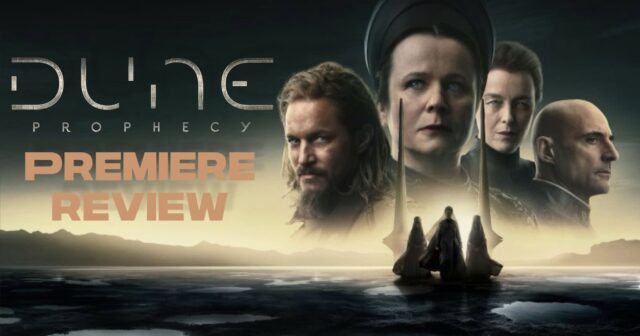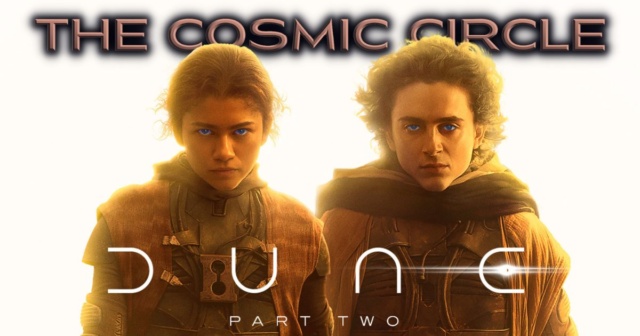The Trials and Rewards of ‘Dune: Part Two’ (A Deadline Contenders Film 2024 Report)
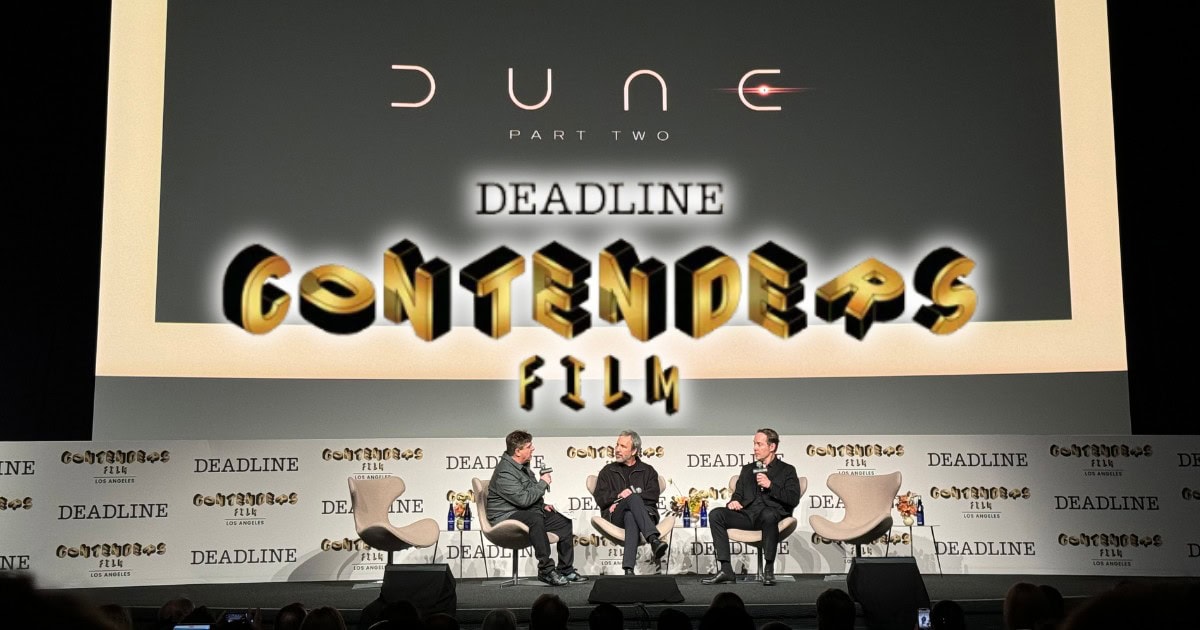
Dune took the world of cinema by storm when it was released in fall 2021, but Dune: Part Two blew the franchise up into a proper phenomenon earlier this year. Hailed by some as one of the greatest film sequels of all time, all eyes are on Academy Award-nominated director Denis Villeneuve and writer Jon Spaihts as they prepare for a third film in the sci-fi franchise. Both attended a panel at Deadline Contenders Film 2024, where they had a chance to shed some light on creating the world of Dune.
[Editor’s note: quotes have been edited slightly for clarity.]
The challenges of adapting Dune
Kicking off the panel, the moderator brought up the fact that many people considered Frank Herbert’s novel to be “unadaptable” to the cinematic medium. Jon Spaihts immediately agreed: “It’s almost true.” Villeneuve jumped in by saying, “John and I made some bold choice[s] on the page that allowed us to [adapt the novel]. So technically, if we had adapted the novel as it is, we would not be here. It would be dead by now. It’s like, it is unadaptable.”
Spaihts continued, “Yeah, it was necessary to make choices and to leave behind things that we, as deep fans of the novel, loved desperately in order to tell the strand of story that could fit into two epic films, and even that was hard work.”
The moderator asked him to talk about landing the ending of Dune: Part Two and making it something that could speak to today’s world, to which Spaihts said: “Frank Herbert himself made a tremendous adjustment in his fictional world around the ending of Dune. He always intended the book as a cautionary tale about messiahs, about charismatic leaders, about the dangers of blending politics and religion, but the ending of Dune, as it was first written, was interpreted by some as a kind of a white figure story. It’s patriarchal. And he had regret about that, so much so that he wrote an entire book to correct course in Dune Messiah. And our way forward into the book and to handle the ending of Dune was to be informed by his own course correction and the light that he shed on his own work.”
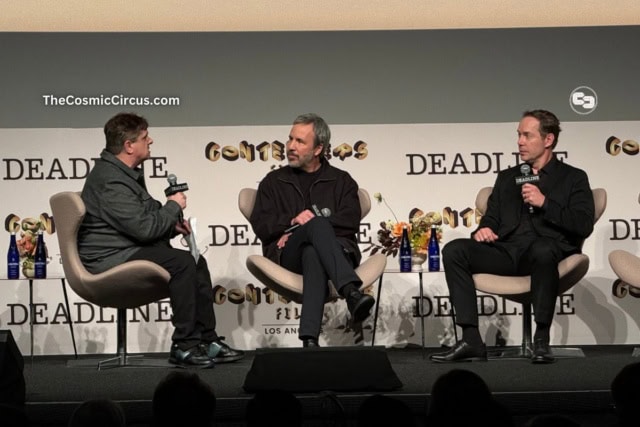
Filming Dune: Part Two
The next question was about the challenges of filming in Jordan, where it’s too hot to film during the day and much of the work had to be done in the early morning or late at night. When asked if filming Dune: Part Two was easier than the first film, Villeneuve responded, “No, no, no, it was much more ambitious and more difficult. We learned a lot by doing Part One. We could see that Part One was almost like a massive rehearsal for the second one, I mean, we learned so much. It’s true that when we shot in Jordan, we shot also in Abu Dhabi, and in Abu Dhabi, when we went there for the first time, it was in the second period of the year. We were aware of that, we were going there for the mornings and evenings during this time. It was too hot. When we went back there, we had to shoot a lot of weeks, a few months there. So we went to another season where it was a tiny bit cooler, but no, shooting in the desert is… don’t try this at home. It’s intense. It’s incredibly inspiring and rewarding. I mean, I cannot complain, I’m just so responsible for that, I’m the one who insisted, but it’s taxing on the crew, definitely it’s difficult.”
The moderator followed up by asking, “What was magical about Jordan? Because it’s not only your film, but Force Awakens has been shot there. Is it just this breathtaking?”
Villeneuve replied, “That’s where David Lean shot Lawrence of Arabia. That was one of the stories that inspired Frank Herbert to write Dune. And I had shot there previously myself, a feature film. I remember, in 2009 when I was scouting there, I was saying to myself, ‘If ever I do a sci-fi movie like Dune, that needs to happen here’ because the rock formations there are out of this world. It’s really impressive, and it offered us tremendous, dramatic landscapes that were perfect for – it is Arrakis, that place.”
When asked how many days they filmed in the desert for the sequel versus the first film’s production, Villeneuve said, “I think that [for] the first film we went in the desert, like maybe a fifth of the shoot, and [for Dune: Part Two] half of the shoot. I mean, it’s many weeks.”
Dune’s stellar cast
Of course, Dune would be nothing without Timothée Chalamet and Zendaya anchoring a fantastic cast of actors. When asked about their chemistry, Villeneuve said, “I think that what is beautiful [is that] they met each other in Part One, briefly. And then spontaneously they became friends, and as we did the promotional tour, their relationship became, let’s say, a deeper meaning – close friends. And for me, it’s a tremendous help, of course because Jon and I had structured the whole story on their relationship through the birth of the love between Paul and Chani, the struggle of this love with pressure from the outside, from the politics, and then the break. It was all about the chemistry between them, I put all my chips on that. So it was crucial to capture that on screen and bring that chemistry on camera.”
The moderator took the question a step further by asking if Villeneuve had conducted a chemistry test between the actors or auditioned them separately. He said, “I did some tests with both of them just to see. Timothée, we had met Zendaya, we did some camera tests, not to test her skills, of course, she’s a tremendous actress. But at the time, I needed to know her. I didn’t. I wanted to see how we could establish that together and how Timothée was feeling. And it was a fantastic experience.”
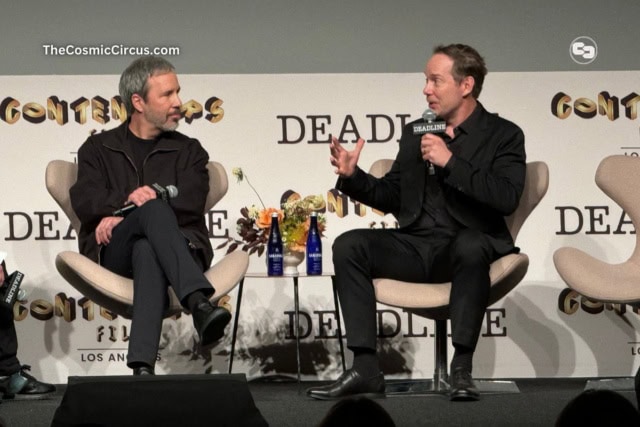
The moderator had to ask about Austin Butler as Feyd-Rautha as well, wondering how “Elvis” could go the distance and make himself so evil. Villeneuve explained, “I should ask him. I mean, Feyd-Rautha, those are big shoes to fill. Austin did an incredible job to go back in that psychotic mode, that sexy psychotic mode, where it’s like a cross mix between Mick Jagger and a sociopath killer. He took tremendous pleasure [in] going there. And it was like we did [something] together about the movement, almost like a dancer, to find a character through movement. Because I don’t think Austin is a psychopath, I’m not. So to reach that level, to go there, we have to experiment, through laboratories with movement.”
Adapting Dune Messiah to film
The biggest question on everyone’s mind is when the third Dune film will be released, so the panel moderator did us all a favor by asking when the team knew there should be a third film.
Villeneuve said, “When I decided to embark on this journey, one of the first things I said is that there’s too much material. And Jon agreed on that, there’s too much material for one movie, for this first book, there’s two movies there, and everybody agreed on that quickly. And I said to myself that I was seeing this as a diptych. It was really two movies, and there will be a possibility of a third act, or sorry, a third installment, where it will be finalized, a curve of [the] dramatic arc of Paul Atreides. But it will be different. It will be a totally different object. So I don’t see this as a trilogy, but I always felt that it will be a great idea to finish that story, but for the reason that Jon was mentioning earlier, to make sure that the ideas that make up Herbet’s initial desires will absolutely be fulfilled on screen.”
Finally, Spaihts was asked how the sequel juxtaposes itself to the first film as it deals with faith in the face of politics. He replied, “We move, as we go from Part One to Part Two, between worlds. We follow closely the journey of Paul Atreides, and he leaves behind the world of the Imperium, the colonizers, the Imperial resource extraction structure of the galaxy, and we immerse ourselves in a thousands of year old culture embedded deep in the deserts of Arrakis and sustained against unimaginable hardships of daily life by a faith, a brutal, practical religion that maintains the iron backbone of the tribe, that teaches survival techniques and a way of life to every person.”
“Religion in this context is total. It’s survival. It’s adaptation. It’s a rule book and a lawbook and a guidebook for living in this impossible place, and the only way that Paul can mold himself into a creature that can live on Arrakis is to wrap his head around that faith, around those laws of the desert. He must adapt or die. And that is what the whole film is about. He goes into it a pauper, a prince without treasure, without palace, without an army. And in the desert, he finds his bearings, and comes out in the end playing a game of chess against the Emperor himself.”
Dune is a fascinating franchise and one that’s caught on very quickly. It’s wonderful to hear how much the creative talent behind this film respect the original vision of author Frank Herbert and how careful they are with adapting his work. Dune 3 may be several years away, but everyone can expect it to be in safe hands with Denis Villeneuve and Jon Spaihts.
What do you think about the Dune films and the new HBO series Dune: Prophecy? Let us know on social media @mycosmiccircus on X and Threads, or @TheCosmicCircus.com on Bluesky!
Dune: Prophecy Premiere Shows Plenty of Promise

